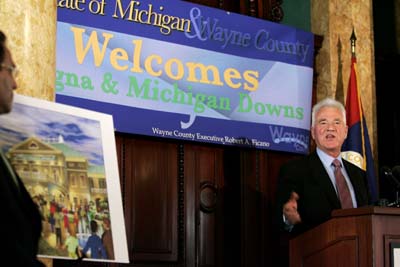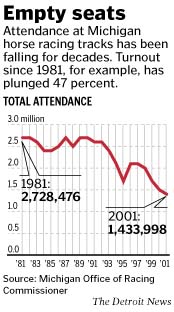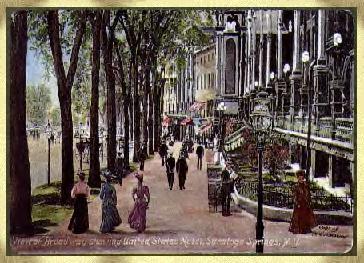Economic Development and Sports, Part 2 (Gambling)
 Announcing receipt of a horsetrack license, Magna International Inc. Chairman Frank Stronach in Romulus last month called the racing license a "trifecta" -- wins for Romulus, Michigan and his company. Many question whether he can deliver. Photo by Max Ortiz, Detroit News.
Announcing receipt of a horsetrack license, Magna International Inc. Chairman Frank Stronach in Romulus last month called the racing license a "trifecta" -- wins for Romulus, Michigan and his company. Many question whether he can deliver. Photo by Max Ortiz, Detroit News.Today's Detroit News reports, in "Magna racetrack record is spotty: Experts question company's ability to deliver $100 million racing facility in Romulus," about Magna Entertainment's announcement to build a $100 million racetrack in Romulus, Michigan (in Wayne County, near the airport). The article expresses skepticism because of Magna's failure to follow through on other announcements in other states, and because video lottery terminals ("liquid crack" slot machines of the type proposed in DC) are not legal in Michigan although casino gambling is legal.
The article linked to past coverage, including this article from September 2002, "Horse racing plans spur talk of revival: Track operators bet on Michigan" which stated that insiders believe "Metro Detroit is prime for more horse racing because of the same demographics that make casino operators -- blamed for sucking dollars from horse racing -- salivate: it's a major population area with higher-than-average per capita income and a predilection for gambling."
 Good investment in a declining industry? Detroit News Graphic from 2002
Good investment in a declining industry? Detroit News Graphic from 2002I find these articles particularly interesting because Magna Entertainment owns Pimlico in Baltimore, home of the Preakness Race, and the company similarly announced that they would invest millions of dollars into the racetrack, and that these investments weren't dependent on slot machines being legalized, but this year announced that no investment would be forthcoming without slot machines, and further that the Preakness Race could leave Maryland unless slots are legalized. (This has been a contentious issue in Maryland. The Governor pushes it and the legislature hasn't been too favorable.)
This led Mayor O'Malley, a candidate for Governor of Maryland in next year's election, to come out in favor of slots. The Baltimore Sun reported this change of heart in the article "Mayor says survival of Md. racing tied to slots: O'Malley stance draws industry praise, attacks by political rivals, gambling foes".
From the article: "The Democratic mayor said critics have questioned the morality of his position backing a limited number of slot machines at racetracks to help the industry compete and to keep the Preakness in Baltimore.But, O'Malley countered, 'Where's the morality in doing away with 18,000 [Maryland] racing jobs? The Preakness is Baltimore's version of the Super Bowl,' said O'Malley, who is expected to run for governor next year. 'We need to rise above partisan politics.'"
The Baltimore Sun has a master webpage that archives continuing coverage on Maryland Political issues, including Slot Machines. (The Washington Post doesn't seem to conveniently bookmark for accessibility and continuity its coverage on ongoing issues such as the construction of a new stadium for the baseball team. However, they do keep their archive accessible for a long time, via Internet-based searching, although you have to remember very carefully what you are searching for.)
________
Note that there was a very good presentation at the National Main Street Conference this year about the Park Heights neighborhood in Baltimore, which abuts the Pimlico Racetrack, home of the Preakness. The neighborhood is extremely distressed.
The session, "Building the Neighborhood from the Core," featured David Dixon from Goody Clancy, who spoke about national trends favoring repopulation of center cities, and by Otis Rolley, director of planning for the City of Baltimore, who talked about Baltimore's planning efforts and actions focused on city building. Both linked the broader themes to specifics on the ground in the context of the Park Heights neighborhood. I thought during the presentation that I never saw an area around a racetrack that was very nice (Hazel Park, Michigan; Arlington Heights, Illinois) but then, I've never been to Saratoga Springs, especially back in the Victorian era.
Goody Clancy webpage on Park Heights, Baltimore.
 Victorian days in Saratoga Springs, New York. Park Heights, Baltimore never looked like this.
Victorian days in Saratoga Springs, New York. Park Heights, Baltimore never looked like this._________
UPDATE: Check out this article from Philadelphia Inquirer, "Ground is broken for Chester harness track and casino" about racing and slots in Pennsylvania, and http://go.philly.com/slots for continuing coverage on slots in Pennsylvania.
And this story from the Park Heights neighborhood in today's Baltimore Sun: "'Vicious cycle' takes its toll on one family: All three of a Pimlico woman's sons died on Baltimore's violent streets. " Will adding slot machines and "saving" the Preakness impact the quality of life much for Baltimore's residents?



0 Comments:
Post a Comment
<< Home